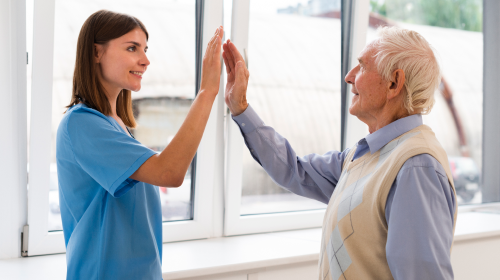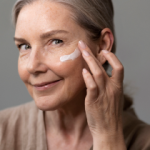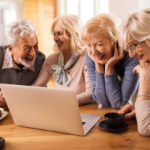The Importance of Geriatric Nursing in Home Care
In a healthcare environment constantly shifting & changing, one profession stands out in its ability to help restore dignity and improve wellbeing for older adults: geriatric nursing. Geriatric nurses (often referred to as gerontological nurses) may work in long-term care facilities or hospitals, but they often work from home, operating behind the scenes and, at times, out of sight altogether. Nurse is not their only title; they are educators, advocates, and companions with a keen and instinctive awareness of the ethereal med./emotional needs of our aging population.
So, where does a geriatric nurse fit in and what is it, exactly? And to what extent do geriatric nurses contribute to nursing care of older adults in the home setting?
A Specialist When You Need Compassionate Precision
A geriatric nurse is a licensed nurse with more than entry-level training in the physiological, psychological, and social dimensions of aging. They have functional responsibilities that go beyond typical nursing intervention; they act as a support/message center in a fragile web of support to help ensure older patients can be safe and healthy in their everyday lives. Whether the geriatric nurse is learning about medication compliance, recognizing subtle changes in cognition, or coordinating care delivery from many providers, they bring clinical precision and compassion into their work.
Geriatric nursing is an even larger distinction (given the nature of home health care) to the extent to which they help promote aging at home. Geriatric nurses support patients and their families in and around the home and work with the system to provide care for patients in ways that are unique and meaningful for older adults, perhaps not found in assisted living or a hospital (not always meant positively). The geriatric nurse is sensitive to the rhythms of the home, developing rapport in such a manner that they are often a trusted presence not only with the patient but also to the family members who are negotiating the sometimes emotional landscape of aging.
Geriatric nurse duties in home care are as varied as the people they serve. The geriatric nurse may begin the morning doing vitals and assessing mobility, in the afternoon prepare a meal and supervise mental health, and in the evening nurse a pain management plan. Each of these actions would be reflected upon from a broad understanding of geriatric syndromes (e.g. fall risks, dementia disorders, etc.) and the ability to take action, when needed.
Communicating is also an important component of the geriatric nurse’s role; they help provide family caretakers with meaningful language about a patient’s care to leverage the knowledge base of family members. The geriatric nurse listens, and listens hard, to a patient’s fears, frustrations, and goals. They validate the tale of growing old, while insuring a sense of autonomy.

Enhancing Quality of Life by Geriatric Home Health Care
At Angel Care Inc., we have seen the changes that geriatric nurses have made by turning home spaces into areas of healing and comfort. The skilled nursing of our seniors is not purely made up of professional assessment of vitals and medications, it includes advocacy also – toward resilience and dignity. It insists our client’s best twilight years are filled with peace, safety and fulfillment, not grim acquiescence.
In a time where fast-paced living overplays older adults as an afterthought, geriatric home health care not only provides a new lens of examination, it aggressively affirms that older adults are again placed ‘in the center of the story’. Geriatric nurses approach their role holistically, and provide not only medically-informed support, but also a bridge between the associated bureaucracy of health care and personalized informality of life at home.
Quiet Heroism Deserving of Recognition
Understanding the role of a geriatric nurse within infrastructure of home care means one has some appreciation of the quiet heroism that unfolds on a daily basis. The geriatric nurse embodies the concept of persistence and a service who holds and secures aging individuals with presence and worth.
At Angel Care Inc., we are able to support these strong and worthy individuals, integrate new geriatric nurses into our home care team, and empower nursing care for seniors at home to be not just present, but also individualized, expertly delivered, and respected.
If you or a loved one may benefit from drawing upon the insight and expertise of a geriatric nurse, we would encourage you to inquire more about our services. After all, every elder in their twilight years deserves not only care but care that reflects the full person.

As we age, our skin changes rapidly- it becomes thinner, drier, and more susceptible to a variety of conditions. Skin care for seniors is critical not only for cosmetic reasons, but more importantly for their overall health and well-being. Proper skin care can help prevent skin discomfort, infections and other complications. Here are a few useful tips to ensure healthy skin in old age. What is Aging Skin? As we age, our skin produces less oil, resulting in a dry skin syndrome. This skin condition, also called xerosis, is often common in the elderly who often complain about itching and impaired skin integrity, which heightens their risk for skin injuries and infections. Essential elderly skin care tips Gentle Cleansing: Select a gentle, fragrance-free cleanser that is marketed as a facial cleanser as these generally do not strip skin oils. Avoid the use of hot water remember to use a short, lukewarm classic bath, or sponge bath and to keep bathing times as short as feasible, to decrease overall dryness. Moisturize Regularly: Apply a thick, fragrance-free moisturizer immediately after bathing to lock in hydration. Choose a product with ceramides, hyaluronic acid, or glycerin since these ingredients are well known to hydrate the skin. Sun Protection: Apply daily a broad-spectrum sunscreen with an SPF of 30 or greater. Prolonged exposure to the sun promotes skinaging and increases the risk of skin cancers. Hydration and Nutrition: Adequate hydration directly affects our skin health. Similarly, a well-balanced diet that includes vitamins A, C, E and omega-3 fatty acids are also very beneficial for the skin. Dark green vegetables, nuts and fatty fish are great options. Avoiding Irritants: Stay away from products that contain alcohol, fragrance or irritating chemicals, as they can aggravate dryness and irritation issues. Dealing with Common Skin Problems in the Elderly Dry Skin: Xerosis: Using emollients regularly can help alleviate dry skin, for very dry skin or advanced xerosis, consult your dermatologist for possible prescription treatment. Skin Infections: Proper hygiene, treating cuts and/or abrasions immediately and monitoring for infection symptoms are key. The skin should be checked on a routine basis to identify signs of infection sooner rather than later. Pressure Ulcers: For the immobile, it is paramount to change position, using pressure relief devices, and assess their skin regularly to prevent pressure sores. Utilizing Home Remedies Home remedies are valued and often incorporated alongside conventional aging skin care routines. Aloe Vera. Aloe vera is soothing for dry or irritated skin; therefore it can be used to manage numerous skin conditions. Coconut Oil. Coconut oil can be very useful because it is oily and anti-inflammatory. Oatmeal Baths. Adding colloidal oatmeal to bath water can help alleviate itching and inflammation of the skin. Note: Always do a patch test, prior to trying anything new, to make sure there is no allergy to it. Developing a Daily Skin Care Routine Establishing a daily skin care routine is essential. You can do this easily, if you make it a simple habit: In the morning: Gentle cleanse Moisturizer SPF sunscreen In the evening: Gentle cleanse Thicker moisturizer (night cream) You may also want to add products with retinoids or peptides to your skincare routine to help reduce fine lines and improve skin texture. These are some of the best skincare products for the elderly. Conclusion In summary, healthy skin in old age takes an understanding of basic skin habits, nutrients, and careful attention to identify potential problems related to skin. By following these simple strategies and focusing on your skin care habits, our skin should remain resilient and comfortable to significantly increase quality of life. Contact the HHA unit at Angel Care Inc., NY for personalized skin care advice and guidance. We are here to support your health in any way we can.

Regaining connections through conversations In the hushed corners of many houses, disconnected from the congestion of busy streets and the things that fill day, lives a generation that built the world we now live in. The seniors - the barriers of memory, wisdom, and experience. Without intentional connection, even the richest of lives can become dim in lonely inactivity. It is here, in this very delicate balance, that the value of social interaction for seniors is not just relevant, but essential. Aging, as noted before is an inevitable pattern in life, comes with an unwinding of the social, built into some of our very life patterns. Friends move away or die, mobility becomes limited, and routines built around community become solitary rhythm. It is here, nestled between a long afternoon silence, and the flicker of a television for a companion, that forgetting about the elderly, combating loneliness becomes both eminently moral purpose, and matter of medical care. At Home care services Angel Care Inc. we recognize that home care for social engagement for the elderly cannot include just clinical care. Well being means both heart wellness, and body wellness. Emotional well being is oftentimes intimately connected to social engagement, and critical to sustaining cognitive functioning, maintaining normal mood, and creating resilience in facing widespread dizzying change. Loneliness poses health risks equally as serious as the health risks of daily smoking 15 cigarettes. While pharmacological assessments (prescribing medication) or bodily status assessments (watching blood pressure) are daily nursing tasks, preventing feelings of loneliness in older adults acknowledge the need for more humane/human-centered options: it needs presence. The Caregiving Role in Social Life The caregiver role is often underestimated in older people's social life but is incredibly powerful. A trained home caregiver is not just an aide who helps with meals or mobility; they are a bridge to the outside world. A caregiver is a conversation partner, a listener, a removable, peaceful presence who turns caregiving into a shared human experience. At Angel Care Inc., caregivers act in multiply compassionate, consistent approaches that support elderly companionship services to reduce the emotional distance barriers faced when elderly companionship is not available. A shared story, gentle laugh, or the intimate cadence of a familiar voice can create bonding richly connected and endowed with meaning. Curating a Social Life at Home For some, "socializing" is defined by gatherings of more than one or as large or massive events, but improving the social life of seniors, or even the quality of their social life can easily begin through smaller, and even mundane or ordinary ways—checking in every day, having coffee and cookies, and board games, listening to music together, asking for help to reconnect with distant relatives via video calls! Those senior socialization activities are also therapeutic lifelines, and importantly, they begin to reclaim or restore their identity and agency. Our professional caregivers are trained to recognize non-verbal cues—body language, mood shifts, withdrawal from favorite activities—that could signal declines in emotional wellness. With awareness and kindness, they raise the level of awareness regarding their elder's and their individual experiences within their socialization, friendship, or situations - encouraging adaptations or opportunities for involvement or social connection, where elder-centeredness is always prioritized in their unique understanding; the pace, variables, and particulars of each individual. Reimagine Aging - Social Engagement for Elderly People To insist on the importance of social engagement for elderly people, is to indicate, to define social aging, that aging should not mean withdrawing socially or having no social environment. Aging can mean social engagement, aging can mean social/pub clubs, aging can mean having friends to share time with. After all, we are biologically relational beings, and as Toldson portraits, our stories, narratives, and human meaningful frameworks of understanding are not constructed alone; they are constructed with others, in conversation. Social engagement is not an option for seniors - It is a right, and moreover, it is incredibly healing. At Angel Care Inc.'s home care that recognizes "people not patients", if family and friends want, we embed social interaction into multiple layers of our home care experience, in ways that allow the senior to re-seed and re-plant joyful moments in the moments daily joyful efforts with adults—where trust, dialogue, and companionship are our most ancillary experiences, not ancillary. A New Chapter - Full of Connections Aging does not have to mean you can be a lot older. The right winds of support can mean a rich chapter filled with reflection, laughter, and connection. If you or someone you love is beginning to navigate the twists and turns of aging at home, think about not just the role of care—but the soul of it. Ask in a moment of vulnerability: Who will listen? Who will sit for a while? Someone can look and listen and help pause. We are that someone at Angel Care Inc. Because nobody should grow old without being seen.



